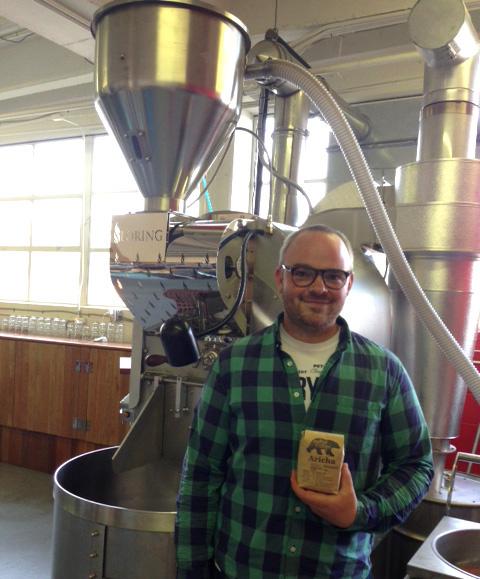From seed to cup: Kuma Coffee Roasters are committed to excellence
Kuma Coffee Production Roaster, Peter Mark Ingalls.
Wed, 07/23/2014
By Christy Wolyniak
Coffee has come a long way in Seattle. Devoted to quality, a handful of Seattle roasters are looking beyond a nondescript bag of beans and to the very heart and source of coffee: the hardworking farmers themselves.
“We call it Seed to Cup in our industry. Knowing the whole chain of where it comes from, how much people are being paid, how it’s grown, and how it’s roasted,” said Kuma Coffee Production Roaster, Peter Mark Ingalls.
“That’s still pretty new and rare instead of just some nondescript bag where you don’t know how people are being treated.”
Fair Trade requires several stipulations of farmers before the coffee is Fair Trade Certified; price per pound is a minimum of $1.69 and paid directly to the cooperative. Direct Trade, on the other hand, is a flexible model involving an agreed upon price between the producer and the buyer, opening trade to a wide variety of farms.
Roasters maintain contact with the producers through Skype, FaceTime, and cell phones and will often visit the farms annually, offering feedback in order to glean the best harvest. Direct Trade buyers can ensure that all transactions go directly to the farmer and will generally pay above the Fair Trade price per pound, about $3-5.00 per pound.
“Direct trade is not a certification, it’s simply a relationship,” said Ingalls. “It’s really rewarding farmers for doing a good job. They are literally getting twice as much for their crop or more.”
Ingalls described the struggle of two farmers from El Salvador, Maria and Javier Botto of the farm Nombre de Dios, who were grateful for their relationship with Kuma after leaf or ‘coffee rust’ took its toll, a common disease caused by a fungus that devastates crops.
“(Javier) was saying if it weren’t for direct relationships like this, his farm would be under this year because they lost about 30 percent of their crop,” said Ingalls.
“If importers and exporters would be buying, farmers would be getting a lower price because there is another person in their chain. If we can buy it direct from them, then they get all of that money.”
Each week, Kuma receives a shipment of at least 1300 pounds of ‘green’ beans; their main suppliers include Guatemala, El Salvador, Ethiopia, Colombia and Kenya.
“We have a commitment to flavor above everything else. We’re not a flashy company, but we focus on quality, quality. Pretty much all we do is source, cup, and roast,” said Ingalls.
The Cup of Excellence is a countrywide competition where farmers present their coffee before a jury of professional tasters who score and rank their coffee. Kuma sources about half of its coffee through importers, while the other half is from Direct Trade – many farmers found through these competitions.
One such farmer was Ernesto Menendez; Kuma Roastmaster Mark Barany first met Menendez in February 2011 in Santa Ana while visiting the J. Hill Mill.
“Ernesto offered to take us up to his newest farm, Las Brumas, on the opposite side of a nearby volcano. Las Brumas means ‘the mist’ or ‘the clouds’ in Spanish. Most mornings the entire farm is covered in clouds and often you can't see more than 20 feet in front of you. Once the clouds burn off, the farm has a clear view of the ocean and is majestic."
Las Brumas won 23rd place in the 2011 Cup of Excellence, first place in 2012, and 22nd place in 2013.
Elevation and the growing process directly affect the quality of the crop. Drying on raised, mesh-type beds that are partially shaded opposed to the historical practice of drying on large cement patios is a new practice that is dramatically increasing the coffee’s flavor, according to Ingalls. Green coffee is also shipping fresher than it was years prior, sealed in Green Pro bags inside the burlap sacks.
Las Brumas yields vanilla, honey and orange creamsicle notes. Each week the crew also roasts two to three single origin espressos and chooses the best to sell.
Kuma focuses primarily on light and medium roasts rather than darker profiles that can impart flavors from the roast rather than embody the raw characteristics of the beans themselves.
“It’s part of preference, but we also believe that’s what tastes the best out of coffee. It’s amazing how floral and fruity coffee can be and it seems sad to just make everything taste like chocolate, carbon and char,” said Ingalls.
Using a state-of-the-art Loring S35 Kestrol roaster, the Kuma team will roast 35 pounds of beans at a time; then package and hand stamp their quality coffee for wholesale distribution to eager cafes in Seattle and around the country.
Clients include Whole Foods Market, Tribant, Neptune Coffee, Portland’s Barista, Toast, and more.
“This year, I am the proudest yet of our sourcing.Getting the perfect ones and the highest quality takes trying hundreds and hundreds of coffees. We try to be super selective and strict and the coffees we bring in, we’re really proud of.”
Kuma recently collaborated with Reuben’s Brews, who holds similar high standards to flavor, to make Kenya cream coffee beer: cream ale blended with Kuma Kenyan coffee. Street Bean Espresso also recently took on Kuma coffee.
For more information visit http://www.kumacoffee.com/.


